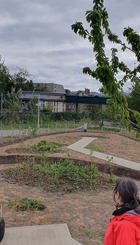Only residents in the following areas can participate:
- Cards
- List
Get Blackhall Growing
2025-05-12 • No comments • • Grow Your Own fund
The project will use a prominent plot on the grounds of Blackhall Primary school, situated on a main road in the local area. It will create a community growing area full of fruit, vegetable, herbs, and edible flowers. The project will engage a range of young people in food production including students from the primary school, who will be given the opportunity (outside the regular curriculum) to grow on the plot, supported by the Outdoor Education team and volunteers from the community. Local youth groups including the Brownies, Guides and Scouts will also be invited to use the plot for their learning and engagement in growing.
We will also aim to engage members of the community beyond our young growers, to encourage intergenerational exchanges on growing your own, and strengthen existing links. For example, the children will visit the local Care Home to showcase and share the produce. We will hold community open days where locals can share the space, learn from what the children have done, and help themselves to produce. We will also foster links with other local primary schools with similar initiatives, share our produce and plants at local events, and share our surplus with local community enterprises (for example the Village Bistro in Davidsons Mains).

Garden @ the Snake
2025-05-11 • 4 comments • • Grow Your Own fund
Vision and Purpose:
This community garden will serve as a multifunctional space that:
- Provides a calm and beautiful resting place for individuals using the active travel networks.
- Engages local people in food-growing practices, offering an accessible way to connect with urban agriculture.
- Supports biodiversity, linking nature networks in Roseburn Path, Union Canal, and Dalry Cemetery, mitigating habitat loss caused by the cycle path development.
- Improves soil permeability to absorb rainfall and reduce flooding risks on Russell Road.
- Promotes community wellbeing by providing a shared space where local people can gather, share knowledge, and engage in meaningful activities that strengthen local connections and deepen community ties.
- Promotes individual wellbeing by enabling people to reconnect with nature, contributing to mental and emotional health through hands-on engagement with soil, plants, and local wildlife.
Environmental resilience and food security:
- Permaculture techniques to manage natural resources at the garden.
- Careful rainwater management (waste water runoff collection by plumbing runoff pipes from cycle path railway bridge into water butts, rain water collection in landscaped swales)
- Improvement of soil structure, stability and nutrient density (Focussing on perennial plants as much as possible to reduce soil disruption, adding organic matter back into the soil with compost and green manure, improving soil water permeability and water retention through surface mulching)
- Natural pollination and pest management by co-planting veg/fruit with flowers and herbs to attract pollinators and pest-managing insects like ladybirds.
Access to food growing knowledge and green skills:
- By encouraging community learning and informed participation in community composting, demonstrated by a fantastic project in Lancaster where residents could take a quick induction course in order to make sure compost composition and maintenance was correct. More community involvement means more compost, which means more food!
- Volunteers at the garden will learn hands-on about food growing, and funding could allow guest experts to come in to teach skills, or to help run interactive sessions.
